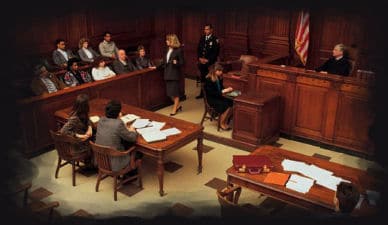What Happens at a 2004 Examination Audit? Everything You Should Know
A Bankruptcy rule 2004 Examination Audit most commonly occurs when the Chapter 7 debtor fails to include income or attempts to hide transfers of concealed assets. But, when the bankruptcy petition is inaccurate, this involves the US Trustee. At that time, the Trustee investigates with a rule 2004 examination. Naturally, this examination rule is under oath, just like a deposition.
Bankruptcy Rule 2004 Examination Audit
These audits are like an IRS audit where the debtor answers questions under oath for about 1–2 hours. Of course, this might continue for days! This happens if the answers are incomplete or the debtor uses creative accounting. Also, the Trustee might ask or subpoena for additional records.
How Does a Rule 2004 Examination Work in a Bankruptcy Case?
A client rarely has to sit through a rule 2004 examination. Most of these examinations happen because the client or the attorney did not complete the schedules accurately and thoroughly. Supplying documentation or explaining an unusual situation often avoids problems. When the Trustee is asking questions, he usually already knows the answer. He is constantly just getting the information on the record about the debtor’s estate, financial status, and other related details.
A Rule 2004 examination of the federal rules happens when items are not entirely explained. A bankruptcy case involving a rule 2004 examination is like a court cross-examination. You will typically be asked to supply records and explain under oath what happened to assets when you failed to include or describe items in your petition. The most common things missed or that need explanation is fraudulent or preferential transfers.
People are also often questioned why the value of their property acquired was listed at a low value. Forgotten, hidden, and concealed assets can also cause a problem. When the petition commencing is inaccurate, the Trustee will question to determine whether the debtor is negligent or whether he is lying. Having the judge or Trustee believe that you are dishonest or foolish can never bring a good result.
The examination under the rule 2004 of the debtor may relate to the act, conduct, or property of the debtor’s financial condition or to any matter that might affect the debtor’s estate or individual’s debt adjustment case under chapter 13 or reorganization case under chapter 11.
Nature of Rule 2004 Examination in Bankruptcy Cases
When a client or an attorney does not entirely or honestly provide information in a petition, the result is a rule 2004 examination of the federal rules in the bankruptcy procedure. The US Trustee, panel trustee, and judge need your accurate information to complete the bankruptcy proceeding and grant it quickly. When you make their work difficult or impossible, a rule 2004 exam is often the result.
The rule 2004 exam is very much like a deposition. Usually, a Trustee only needs 5 minutes to question the debtor’s finances and debtor’s residence details during a 341 hearing and then approves the petition and moves on to the next case. The government already has your property records, income taxes, and bank statements. They also have the licenses and records of any auto, boat, or home transfers and whether you have recently won any lottery.
People will often be under stress when they prepare the petition. They can forget a gift to a daughter, or they may not even know grandma put them on her deed. The results for omissions and negligence are just as bad as being dishonest. If the petition is not prepared entirely and clearly to show your financial condition, then the debtor’s finances will be audited.
Results to Expect in Rule 2004 Examination Audit
In bankruptcy cases involving minor errors in a rule 2004 exam may require an amendment to the petition for greater accuracy or less confusion. If the case has major errors, the Trustee may deny a discharge, need to convert from Chapter 7 to Chapter 13, or may file for a dismissal. For the worst-case scenarios, it may be sent to the AUSA (Assistant United States Attorney) for criminal prosecution. However, that very rarely happens.
Who Can Ask for a Bankruptcy Rule 2004 Examination Audit?
Interestingly, the use of the rule 2004 exam in bankruptcy procedure of the federal rule varies, depending on who requests the audit. It is worth noting that the scope of the audit is expansive, with many referring to it as a fishing expedition. Below is a list of who might request the exam and why. A creditor or other interested party may also request to ask questions in a 2004 exam, which is rare in a consumer case and more common in a business case. I have seen ex-wives, business customers, and business partners ask for a 2004 exam.
What to Expect if the Trustee Requests the Rule 2004 Examination Audit
Usually, the Trustee requests a 2004 Exam to examine the following:
- The location of your assets
- All your financial transactions
- The truthfulness of the bankruptcy schedules and other papers
- If there is fraud occurring. This includes fraudulent and preferential transfers.
What to Expect if the Creditor Requests the 2004 Examination Audit
A creditor might also request an audit for the following reasons:
- To locate a property that is not included in the bankruptcy procedure
- To find facts about inaccurate information on a credit application.
- Or, they might question credit card purchases made before filing.
Reasons the Debtor Might Request the 2004 Examination Audit
The debtor might also find a 2004 exam useful, as well. You can question the mortgage company and ask them to explain the charges. The debtor could check into a potential non-dischargeability claim before filing an adversary proceeding.
Avoid Delay in Submitting Relevant Documents Requested by the Trustee
During a Bankruptcy procedure of 2004 Examination Audit of the federal rules, if the Trustee asks to produce documents, the debtor must provide documents, electronically stored information, and other matter relevant to the case to them. However, if the debtor does not submit the documents to the Trustee within the 14-day requirement, the Trustee files a motion to dismiss the case. Then, the debtor loses his $338 filing fee and all the funds he paid to the attorney.
Unfortunately, this is all because of the delay from not supplying documents. Then, the case must be re-filed, and the debtor must start again. That’s why this golden rule exists in filing bankruptcy in the bankruptcy court to document and accurately disclose everything about your financial condition—then provide documentation.
What are the Rule 2004 Examination Limits?
There are very few limits to a 2004 audit. You can plead the 5th amendment if you think the requested information may result in criminal prosecution, but the case is very likely to be dismissed for the failure to answer.
I have seen employers hauled into court for a rule 2004 examination to determine a Debtor’s income. Accountants have been subpoenaed and asked to bring in their records. Spouses and relatives can be subpoenaed and questioned. Business records are subject to being hauled in. There are very few limits to the Trustee and bankruptcy court judge in obtaining any information they need to do their job.
Most people become nervous over being questioned for 5 minutes in the presence of a court reporter. Imagine questioning, which can go on for hours or days. The law firm you have hired and attorneys will charge for this added time. If the attorney caused the problem by not being clear and complete in the petition, he should not charge a fee. However, it is not the attorney’s fault if the client has not been honest.
Hire a Professional Attorney to Get Reliable Help in Your Bankruptcy Case!
Quality attorneys probably have less than one 2004 exam per 100 cases. The attorney should catch these errors. But if the client truly forgets or is dishonest, an attorney may not detect the error. With experience, it becomes rare for an attorney not to catch these problems.
In some cases, it is the attorney’s fault. This is the reason to get an attorney with the knowledge and experience. Having an attorney who will not back down when the client makes a simple error is also essential. You don’t want the attorney who folds like a lawn chair. If you have questions, see us.
Resources for Bankruptcy
Louisville, Kentucky Bankruptcy Forms
Other Related Information
What the Trustee is Looking For
Convert from One Bankruptcy Chapter to Another
File Bankruptcy Online in Louisville, Kentucky
Finishing a Chapter 13 Plan and Getting a Complete Discharge
If you are facing bankruptcy, don’t delay because timing is crucial. I am here to help you. So, contact my office right away to start the conversation. Nick C. Thompson, Bankruptcy Lawyer: 502-625-0905







